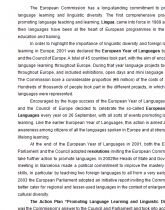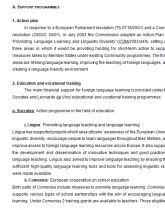Hľadaj
Zobraz:
Univerzity
Kategórie
Rozšírené vyhľadávanie
45 144
projektov
Language policy of EU
| Prípona .doc |
Typ seminárna práca |
Stiahnuté 0 x |
| Veľkosť 0,1 MB |
Jazyk anglický |
ID projektu 10079 |
| Posledná úprava 10.10.2018 |
Zobrazené 1 502 x |
Autor: lucia11 |
 Zdieľaj na Facebooku
Zdieľaj na Facebooku |
||
| Detaily projektu | ||
- cena:
10 Kreditov - kvalita:
92,6% -
Stiahni
- Pridaj na porovnanie
- Univerzita:Ekonomická univerzita v Bratislave
- Fakulta:Obchodná fakulta
- Kategória:Ekonomika » Diplomacia a komunikácia
- Predmet:International communication
- Študijný program:-
- Ročník:3. ročník
- Formát:MS Office Word (.doc)
- Rozsah A4:18 strán
The peoples of Europe are building a single Union out of many diverse nations,
communities, cultures and language groups. It is a Union built around the equal
interchange of ideas and traditions and founded upon mutual acceptance of peoples with different histories but a common future. Building a common home in which to live
together in harmony whilst maintaining the individuality and diversity of each means
acquiring the skills to communicate with one another effectively and to understand one
another better.
The act of learning and speaking other languages encourages the learner to open himself up to other people and to begin to understand other cultures and outlooks: essential skills in a world menaced by racism and xenophobia. The European Union is home to almost 500 million Europeans from diverse ethnic, cultural and linguistic backgrounds. It will be more important than ever that citizens have the skills necessary to understand and communicate with their neighbours.
The European Union is developing a society based upon knowledge. The ability to understand and communicate in other languages is now one of the basic skills that citizens need if they are to participate fully in European society.
communities, cultures and language groups. It is a Union built around the equal
interchange of ideas and traditions and founded upon mutual acceptance of peoples with different histories but a common future. Building a common home in which to live
together in harmony whilst maintaining the individuality and diversity of each means
acquiring the skills to communicate with one another effectively and to understand one
another better.
The act of learning and speaking other languages encourages the learner to open himself up to other people and to begin to understand other cultures and outlooks: essential skills in a world menaced by racism and xenophobia. The European Union is home to almost 500 million Europeans from diverse ethnic, cultural and linguistic backgrounds. It will be more important than ever that citizens have the skills necessary to understand and communicate with their neighbours.
The European Union is developing a society based upon knowledge. The ability to understand and communicate in other languages is now one of the basic skills that citizens need if they are to participate fully in European society.
Kľúčové slová:
European Union
society
multilingualism
nation
culture
language group
learning
communication
languages
Obsah:
- I. Introduction
II. Language policy of EU
2.1 Legal basis
2.2 Role of the european parliament
2.2.1 Principle of multilingualism applying to parliament's work
III. Promoting language learning and linguistic diversity in EU
IV. Achievements
V. The action plan “promoting language learning and linguistic diversity
VI. Conclusion
References
Zdroje:






